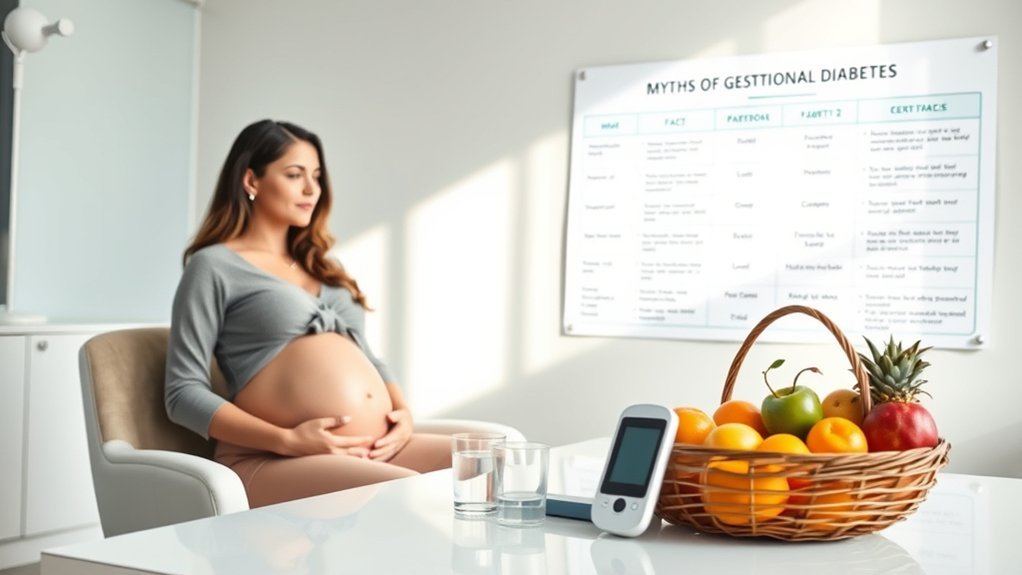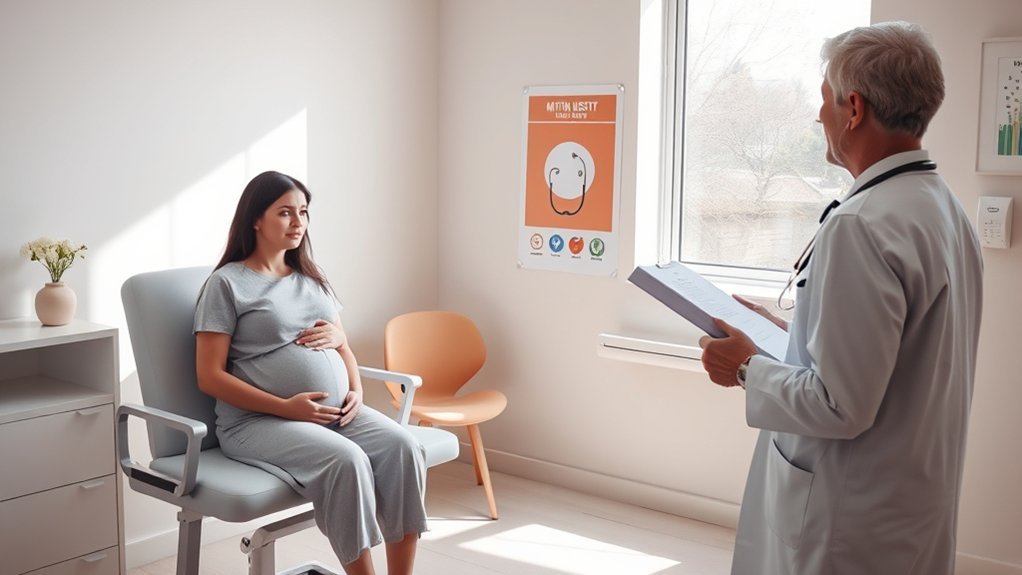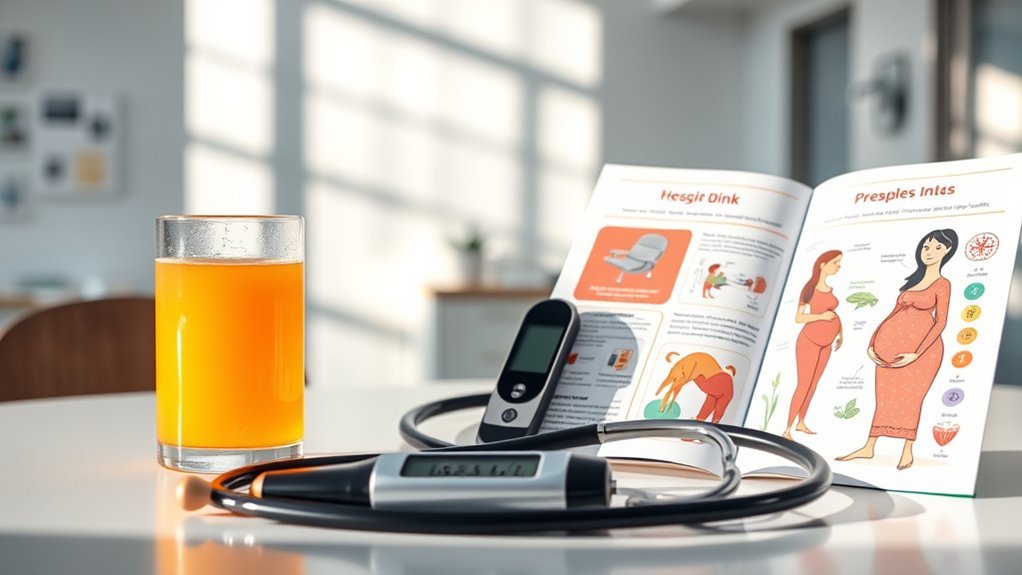Many people don’t realize that gestational diabetes can affect any pregnant woman, not just those with risk factors. This misunderstanding often leads to missed opportunities for early detection, which is vital for ensuring a healthy pregnancy. As we explore the myths and facts surrounding gestational diabetes screening, you’ll discover why screening is essential for every expectant mother and how it can greatly impact both mother and baby’s health.
Understanding Gestational Diabetes: What It Is and Why It Matters

Gestational diabetes occurs when your body can’t produce enough insulin during pregnancy, leading to high blood sugar levels. It typically develops around the 24th week of pregnancy and can affect both you and your baby.
If left unmanaged, it can lead to complications such as excessive weight gain for your baby, preterm birth, and an increased risk of developing type 2 diabetes later in life for both of you.
Recognizing and managing gestational diabetes is essential, as it allows you to take steps to control your blood sugar levels through diet, exercise, and, if necessary, medication.
Common Myths About Gestational Diabetes Screening

You might believe that only high-risk women need gestational diabetes screening, but that’s not the case.
In fact, all pregnant women are recommended to undergo screening, regardless of their risk factors.
Understanding these common myths can help you make informed decisions about your health and your baby’s well-being.
Screening Only for High-Risk
Many people believe that only those at high risk for gestational diabetes need screening, but this is a common myth. In reality, gestational diabetes can affect anyone during pregnancy, regardless of risk factors. Early detection is essential for your health and your baby’s well-being.
| High-Risk Factors | Why Screening Matters |
|---|---|
| Family history of diabetes | Prevents complications |
| Obesity | Guarantees proper management |
| Previous gestational diabetes | Supports healthier outcomes |
All Women Need Screening
Although some might think that only high-risk individuals need screening for gestational diabetes, the truth is that all pregnant women should be tested.
Gestational diabetes can occur in anyone, regardless of weight, age, or family history. Early detection is vital to guarantee the health of both you and your baby.
Here are three reasons why screening is essential for every pregnant woman:
- Prevent Complications: Identifying gestational diabetes early helps prevent potential complications during pregnancy and delivery.
- Monitor Baby’s Health: Regular screening allows healthcare providers to monitor the baby’s growth and well-being effectively.
- Promote Healthy Choices: Screening encourages you to adopt healthier lifestyle changes that benefit both you and your child.
Don’t underestimate the importance of this essential screening!
The Importance of Early Detection and Screening

Early detection and screening for gestational diabetes are essential for identifying risk factors that may affect you and your baby.
Understanding the health impacts can empower you to make informed choices, ensuring better management strategies are in place.
Risk Factors Identification
Identifying risk factors for gestational diabetes is crucial, as it enables healthcare providers to implement early screening and interventions that can greatly improve outcomes for both mothers and babies.
By recognizing these risk factors, you can take proactive steps in your healthcare journey.
Here are three key risk factors to take into account:
- Obesity: A higher body mass index (BMI) increases the likelihood of developing gestational diabetes.
- Age: Women over 25 years old are at a greater risk of gestational diabetes.
- Family History: A family history of diabetes can elevate your risk considerably.
Understanding these factors allows you to discuss personalized screening options with your healthcare provider, ensuring the best possible care for you and your baby.
Health Impact Awareness
When it comes to gestational diabetes, knowing the importance of early detection and screening can greatly influence your health and your baby’s wellbeing.
Research shows that undiagnosed gestational diabetes can lead to complications such as excessive birth weight, preterm delivery, and even future health issues for both you and your child.
By participating in routine screening, you can identify high blood sugar levels early and take necessary steps to manage them.
Early intervention not only reduces the risk of complications but also helps guarantee a healthier pregnancy and delivery.
Remember, the earlier you address potential issues, the better your outcomes will be.
Prioritizing screening is a proactive step you can take for both yourself and your growing baby.
Management Strategies Development
Although managing gestational diabetes can seem overwhelming, having a clear strategy in place greatly enhances your ability to maintain healthy blood sugar levels.
Early detection and proper management can markedly improve outcomes for both you and your baby. Here are three essential strategies to reflect on:
- Regular Monitoring: Track your blood sugar levels consistently to understand how different foods and activities affect you.
- Balanced Diet: Focus on a nutritious, well-balanced diet rich in whole grains, lean proteins, and plenty of fruits and vegetables to stabilize your blood sugar.
- Physical Activity: Incorporate moderate exercise, like walking or prenatal yoga, to help manage weight and improve insulin sensitivity.
Who Is at Risk for Gestational Diabetes?
Certain factors can considerably increase your chances of developing gestational diabetes during pregnancy. Understanding these risks helps you take proactive steps for your health and your baby’s. Here’s a quick breakdown of common risk factors:
| Risk Factor | Description |
|---|---|
| Age over 25 | Higher risk as age increases |
| Family history | Diabetes in family raises your risk |
| Obesity | Higher body mass index (BMI) is a concern |
| Previous gestational diabetes | Past history increases likelihood |
| Ethnicity | Certain groups (e.g., Hispanic, African American) are at higher risk |
If you identify with any of these factors, it’s important to discuss them with your healthcare provider to guarantee you receive the necessary support throughout your pregnancy.
The Screening Process: What to Expect
As you navigate your pregnancy, understanding the screening process for gestational diabetes can empower you to take charge of your health.
Typically, you’ll undergo screening between 24 and 28 weeks of pregnancy. Here’s what you can expect:
Typically, screening for gestational diabetes occurs between 24 and 28 weeks of pregnancy.
- Glucose Challenge Test: You’ll drink a sugary beverage and have your blood tested an hour later to see how your body processes sugar.
- Follow-up Testing: If your initial results are elevated, you may need a three-hour glucose tolerance test to confirm a diagnosis.
- Results Discussion: Your healthcare provider will review your results with you, discussing any necessary next steps and support.
Being informed about this process can help reduce anxiety and prepare you for what lies ahead.
Managing Gestational Diabetes: Facts and Recommendations
Managing gestational diabetes can feel overwhelming, but with the right approach, you can maintain your health and support your baby’s development. Start by monitoring your blood sugar levels regularly and follow a balanced diet rich in whole foods. Incorporating physical activity can also help regulate your glucose levels.
| Recommendation | Tips | Benefits |
|---|---|---|
| Monitor blood sugar | Use a glucometer | Track your glucose levels |
| Eat balanced meals | Include proteins & fiber | Stabilize blood sugar |
| Exercise regularly | Walk or swim daily | Improve insulin sensitivity |
| Consult healthcare team | Regular check-ups | Personalized support |
Frequently Asked Questions
Can Gestational Diabetes Affect My Baby’s Long-Term Health?
Yes, gestational diabetes can affect your baby’s long-term health, increasing their risk for obesity, type 2 diabetes, and metabolic issues later in life. Monitoring and managing your condition during pregnancy can help mitigate these risks.
How Often Should I Get Screened During Pregnancy?
Think of your pregnancy as a garden; regular screenings are like watering it. You should get screened for gestational diabetes around 24-28 weeks, and possibly earlier if you’re at higher risk. Stay proactive for your baby’s health.
Is Gestational Diabetes Reversible After Pregnancy?
Yes, gestational diabetes often reverses after pregnancy. Most women see their blood sugar levels return to normal. However, it’s essential to maintain a healthy lifestyle, as you’re still at risk for type 2 diabetes later.
What Dietary Changes Can Help Manage Gestational Diabetes?
To manage gestational diabetes, you should focus on a balanced diet rich in whole grains, lean proteins, healthy fats, and plenty of fruits and vegetables. Monitoring portion sizes and meal timing can also help maintain stable blood sugar levels.
Will I Need Insulin if Diagnosed With Gestational Diabetes?
You might need insulin if your blood sugar levels can’t be managed through diet and exercise alone. Your healthcare provider will monitor your situation and recommend the best approach tailored to your needs.
Conclusion
So, if you thought gestational diabetes screening was just for those “doomed to fail,” think again! Ignoring the facts won’t help you or your baby. Everyone deserves a chance at a healthy pregnancy, even if you think you’re invincible. Remember, early detection is your best friend—much like your favorite snack during those late-night cravings. So, let’s ditch the myths and embrace the truth for happier, healthier outcomes. After all, who wouldn’t want a smooth delivery?
